
N.C. COAST – Abandoned boats and finding ways to deal with them are not new issues for eastern North Carolina. Locating owners or funding the removal of an abandoned boat are just some of the hurdles involved in cleaning up a vessel left to rot where it sits.
“We don’t really have adequate laws (in North Carolina) that address this and there’s no teeth in much of anything to deal with (abandoned boats),” said Judy Hills, executive director of the Eastern Carolina Council of Governments.
Supporter Spotlight
And except for a few limited instances, the federal government doesn’t offer much assistance.

A report from the U.S. Government Accountability Office published in March found that federal agencies face some of the same challenges as local and state governments when it comes to handling abandoned and derelict vessels, also referred to ADVs: there’s simply not enough money and not enough regulations for cleaning up such vessels.
There are some cases in which federal agencies like the Coast Guard, the Corps of Engineers, the Federal Emergency Management Agency or others will get involved with an abandoned or derelict vessel. But those cases are limited to vessels in federally maintained waterways, containing potential pollutants or that were grounded or considered debris due to a major storm event.
According to the study, those agencies felt they had little or no responsibility to be involved in vessel cleanup outside the parameters laid out in federal statute.
“Agencies reported they generally did not have funding to support actions beyond responding to ADVs posing navigation hazards in federally-maintained waterways and pollution and public health threats, nor were they required to do so by federal law or agency policy,” the report states.
Supporter Spotlight
Many states are taking it upon themselves to clean up abandoned boats. The study surveyed 28 coastal states, and 18 of those reported identifying more than 5,600 abandoned or derelict vessels between 2013 and 2016 – 88 percent being recreational vessels under 40 feet in length. Of the 5,600 abandoned vessels identified, just more than 3,000 were removed.
While North Carolina responded to the survey, it was not one of the 18 states to identify or remove abandoned vessels. It reported that it did not know the number of ADVs during the three-year time period.

Hills, a recreational boater who has championed an abandoned boat monitoring program for the state in years past, called the issue complex.
Some of the complexities include locating owners when all identifiers have been removed from the vessel, private property rights, insurance and more – let alone keeping track of abandoned boats, she said.
“Other states have a more active monitoring program, like Florida, where it’s kind of like an abandoned car, they’ll go put a sticker on (the abandoned boat),” she said. “They’ll mark it and put it on a GIS mapping system and go back and check on them periodically and send notices to people about them. And we just don’t have anything like that here in North Carolina.”
In North Carolina, the Wildlife Resources Commission handles the titling and registering of boats, as well as the state’s Boating and Water Safety provisions for abandoned vessels, according to WRC Land and Water Access Section Chief Brian McRae.
He explained that though state laws don’t require the removal of an abandoned or derelict boat, there is procedure for a person who finds such a boat to apply for ownership of the vessel.
“The Wildlife Resources Commission’s procedures … allow a person who finds an abandoned vessel to become the registered and titled owner, provided the previous owner(s) cannot be located and have not reported the vessel missing or stolen,” McRae said in an email.
“This issue becomes a little more complicated if the abandoned vessel is hindering the launching or retrieving of vessels at a WRC Boat Access Area or posing a danger at a WRC Boat Access Area. In these circumstances, we will conduct a title search but eventually take on the salvage and remove costs to get it taken care of.”
McRae said while there are criminal charges that can be filed for abandoning a vessel, the state has no mechanism to force an individual to remove a vessel.
“The only reference to removal requirements for abandoned vessels in North Carolina in under N.C. Gen. Stat. § 143-355(b)(5). It states that the Department of Environment and Natural Resources (now known as the Department of Environmental Quality) is required to cooperate with the U.S. Army Corps of Engineers in removing ‘any wrecked, sunken or abandoned vessel or unauthorized obstructions and encroachments in public harbors, channels, waterways and tidewaters of the state,’” he said.
Hills said she tried in the past to get a monitoring program for the state with the commission but was unsuccessful.
“We showed (the commission) what Florida is doing as far as monitoring and tagging (abandoned boats). We made a pitch and basically the bottom line (from the commission) is, ‘We don’t have the resources,’” Hills said.
“I’m not saying there wasn’t an interest there – they understand there is a problem,” she continued. “But my impression was: ‘Unless somebody dictates that to (the commission), we really don’t want to have any responsibility.’ And you can’t blame them. They don’t have unlimited resources and it’s a tremendously complex problem.”
That can leave local governments in the lurch when it comes to cleaning up scenic waterfronts and harbors.
“(Local governments) could expend the funds (for removal) if they so desired, but if you do it for one, you have to do it for everybody,” Hills said. “So it’s a really hard decision, and there really isn’t any money for it.”
Some local governments have taken matters into their own hands. Kyle Garner, the planning and inspections director for Beaufort, said the town has an ordinance outlining the procedure to follow should a boat need to be removed from Taylor’s Creek.
The procedure includes everything from attempting to locate the boat’s owner, to posting public notice that the boat will be removed, to working with a local marine towing company for the removal.
“We want to make sure we do things the right way and the ultimate goal is abatement or getting the areas cleaned up and sometimes it takes time,” Garner said. “But it’s a worthy endeavor and when it’s done it’s hopefully finished and you’ve met your goal.”
Garner said town officials recently met with representatives of the Corps of Engineers to discuss possible efforts on Beaufort’s part to remove sunken boats in Town Creek.
Though Town Creek is a federal harbor of refuge, it is not a federally maintained waterway, so the Corps is not required or funded to remove vessels there.
Dealing with and cleaning up abandoned and derelict vessels is an ongoing challenge for many coastal areas, Garner said.
“It’s going to be a challenge not only for us, but for coastal areas throughout the country. And we’re not the only community that has some of these vessels in just deplorable shape,” Garner said. “It’s a shame they’ve gotten there, but (cleaning them up is) something we have to do to help protect the environment of our areas and our waterways here – and not only what I would consider the fragile environment but also the visual environment, the aesthetic environment.”







